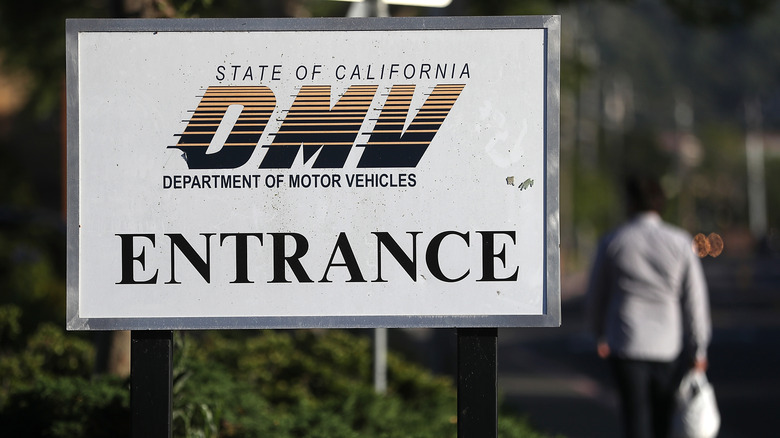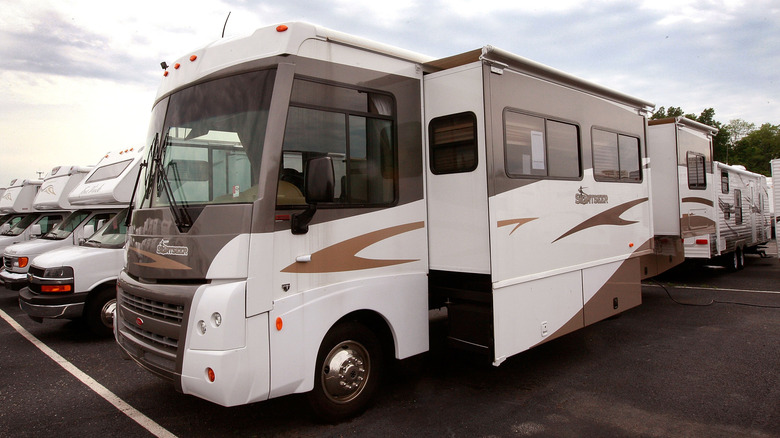Do You Need A Special License To Drive An RV? Here's What You Need To Know
In 2025, approximately 11.2 million households in the U.S. own an RV, according to Consumer Affairs. And if you've had a glimpse lately at some of the coolest camping RVs ever built, it's not hard to understand the growing popularity. If you're looking to join the increasing number of people taking to the open road in a motorhome, you might be wondering if you need a special license to legally drive one. The short answer: it depends. But fortunately, in most cases, you do not need anything but a standard driver's license to legally operate an RV.
There are some factors that determine if you need a special license to drive an RV: your state regulations and the weight of the vehicle. The term RV generally describes several types of vehicles, but in this case, RV is specifically referencing a motorhome or travel van. A standard driver's license allows you to legally operate vehicles weighing under 26,000 pounds across the U.S. This is why you're able to rent and drive a big box truck when moving. While RVs come in a variety of sizes and weights, most of your options will fall under 26,000 pounds, meaning a standard license is all that's needed. Unfortunately, rules vary by state, with some adding a length stipulation and commercial or Class B license requirements if a vehicle is over the threshold.
Some states have zero requirements while others include length regulations and additional licensing
While there are places like Arizona, Tennessee, and Maine, among many others, which have no special license requirements for operating an RV, other states aren't as lenient. For example, Wisconsin demands that any vehicle over 45 feet in length must be operated by someone with a commercial driver's license. It may not be surprising, with several weird California traffic laws that still exist, but the Golden State requires you to have a non-commercial Class B license if your RV is either over 26,000 pounds or longer than 40 feet.
Fortunately, unless you're going for the largest options among motorhomes, you shouldn't need to worry about these regulations, but you should review the rules of your home state before making any purchases. For a first-timer, it's a good idea not to select a massive motorhome as your first rig anyway, as it'll likely be the largest vehicle you've ever driven. Beginners might feel more comfortable in a more compact RV, which wouldn't even come close to requiring additional licensing in any state. It's still helpful to understand the various classes of vehicles available, which feature different ranges of lengths and weights.
The different RV classes, sizes, and weight ranges
There are a variety of RVs available, which are separated into classes. Class B identifies some of the lightest RVs in the form of van campers. For example, the 2026 Thor Freedom Elite 17D sleeps two with a gross vehicle weight rating (GVWR) of 8,550 pounds. Not only are these RVs light, but you can find several budget-friendly camper vans that won't break the bank. These vans can range in length from just over 17 feet to 22 feet.
Class C describes a type of motorhome that is built off a van chassis, includes a front cab (with driver and passenger doors), but then adds an expansive living section on the back, with a separate entrance. These can be sized anywhere from around 20 feet with a GVWR of 11,500 pounds to something over 30 feet, with a maximum GVWR of over 14,000 pounds.
Class A motorhomes are the largest, with some of them easily eclipsing the 26,000-pound regulation and length requirement of some states. Some Class A diesel motorhomes, like the Newmar Dutch Star, can stretch out to over 43 feet long with a GVWR of 41,000 pounds, which is one example of an RV that might require a special license depending on your home state.


